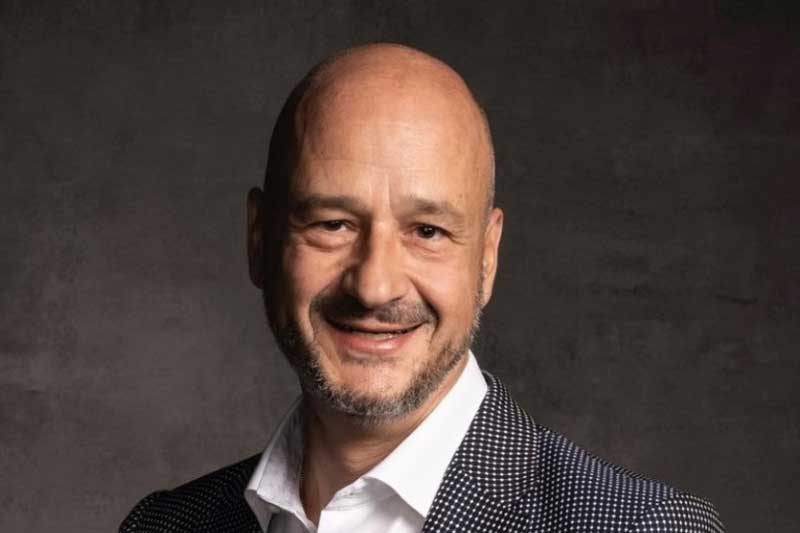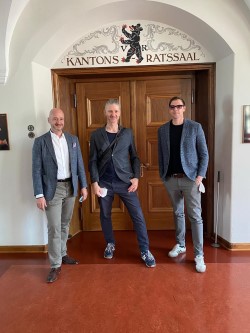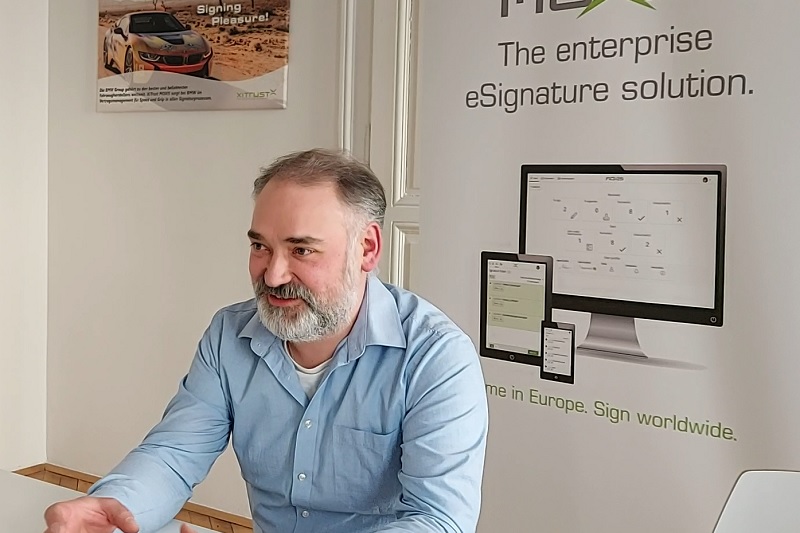"The time is ripe! Not only in Switzerland."

by Christoph Schomberg
in Society & Culture, News, Company
04 May 2021
With the founding of XiTrust AG, XiTrust is now also represented with a subsidiary in Switzerland. The company is supported by a very experienced and competent Swiss consultant. Christoph Schomberg spoke to Damir Bogdan for the XiTrust Magazine.
XiTrust Magazine: Mr Bogdan, you advise companies on transformation issues around digitalisation and are CEO of your company Actvide. Your guiding principle is 'Transformation Advisory'. Tell us a bit about your self-image and your company.
Damir Bogdan: The company name is borrowed from Latin. It combines 'action' and 'seeing'. A very conscious choice. I don't just want to accompany companies through the digital transformation, but to see at the end of the joint journey which measures, which action steps have really been taken. What has worked, where can further optimisation be made? In our challenging times, it is no longer enough to wait passively.
You have gained your experience over many years in various positions ...
Bogdan: The spectrum actually ranges from programming to managing the entire computer science. It goes back to the late 80s, where I studied at the University of St. Gallen and programmed COBOL as a trainee. After that came project management and strategic planning, including for the IT subsidiary of Swisscom. Also important were the almost ten years I spent on the executive board of the Raiffeisen Group Switzerland as CIO.
Technology, strategy and management are your three pillars?
Bogdan: And on top of that, I built the bridge to innovation. I learned a lot in this field during my time in the USA, in Silicon Valley.
Of course, modern CEOs need to have their position – and positions – questioned from time to time.
Damir Bogdan
You will support XiTrust with immediate effect as a member of the Board of Directors of the Swiss XiTrust AG. You are also active on various other Swiss boards of directors and advise the University of St. Gallen. What keeps you going?
Bogdan: It is fascinating to me helping companies to find their 'desired future' and to accompany them in the first steps towards it. In doing so, I orient myself to the respective ideas and combine them with my experience and outside perspective. We want to know: What is the future raison d'être for the company? What can we improve for our customers? What specific goal are we actually pursuing with technical innovations? Remain curious and be prepared to constantly evolve.
You also coach CEOs. A difficult clientele who are used to making their own decisions and setting the direction. Is that as challenging as it sounds?
Bogdan: You are right, this group is characterised by a high degree of independence and decision-making power. It is essential to hear someone from the outside who can also act as a corrective. Of course, modern CEOs have to have their position – and positions – questioned from time to time. I like to draw a comparison to the court jesters of the Middle Ages: they could openly address and criticise something without being immediately beheaded by the monarch.
I see your head is still on. Where do today's CEOs need advice?
Bogdan: In my experience, it is important to always question the hierarchical structures of a company. I am not saying that there is no need for a senior to set the direction. It is just essential today, regardless of hierarchies, to act in networks within a company: The person who has the greatest competence and the greatest experience in a topic should then also have the lead. This can be, but does not necessarily have to be the management. Companies should just not think automatically in hierarchies. That no longer fits in today's digital transformation.
A consultant colleague from Germany once called it "solution-focused teams".
Bogdan: That indeed makes sense. Only when the best possible competences are gathered in working groups can problems be solved efficiently and, in most cases, faster. Today, the boss function should no longer be equated 1:1 with the leadership position.
The transformation of companies is progressing at a rapid pace. How can a corporate culture that has often evolved over decades keep pace without overwhelming the players?
Bogdan: Staying innovative always means questioning strategies and adapting organisational forms as needed. Simply replacing analogue ways of working with digital ones is not yet a digital transformation. I also prefer to speak of transformation, because that comes first and is a prerequisite for effective digitalisation. Good strategy management is therefore characterised by a critical view: What is the real benefit of digitalisation for the company? The company must have a clear vision for this and thus develop its own awareness, otherwise any digitalisation is barely more than a technological fig leaf.

from left to right: Damir Bogdan (Board of Directors XiTrust AG), Andreas Koller (CEO XiTrust GER/CH), Georg Lindsberger (CEO XiTrust)
You are also active in Silicon Valley and have extensive contacts in the US tech industry. What do US companies do differently than Europeans?
Bogdan: First of all, such comparisons are always problematic. As in Europe, there are many different mentalities in the USA: a New York financial expert has a different problem solving approach than a tech start-up in California. A Finnish IT company certainly has a different culture than a Central European one. But the core principle is: things do go wrong sometimes. What we need even more in Europe is a dedicated risk culture. Modern US companies, especially in Silicon Valley, are way ahead of us when it comes to risk-taking. The idea behind it makes sense: an employee who internalises this is much more at ease with new technology and contributes his or her own ideas. CEOs also need to work on their perspective. It should no longer be: We lost 10,000 euros because of a mistake, but we invested 10,000 euros in our further development.
It is precisely the investment volumes that are likely to make the difference here and there.
Bogdan: Let's take Switzerland as an example. It is a very innovative country and of course there is also investment in start-ups. But while it's not uncommon to see investment sums in the hundreds of millions in the US, it's still too rare to find the staying power to build an entire ecosystem from scratch here. You need more than ten or 15 million euros for that. As a result, the best start-ups migrate to countries with a different investment climate.
The digital signature increases internal company efficiency and at the same time facilitates the exchange with customers and partners.
Damir Bogdan
Let's stay in Switzerland right away. As an entrepreneur, manager and consultant, you are more familiar with this market than with any other. How do you see this economic area today, also in terms of IT innovations, such as eSignatures with MOXIS?
Bogdan: Switzerland is rightfully considered the world champion in innovation in many fields. In the digital transformation of companies, networking in their own ecosystems is just as important as standardisation. One basis for this is effective and efficient processes. I still see a lot of potential here.
In which way?
Bogdan: Even very large companies are still in the middle of the transition phase from the analogue world to the purely digital one. A simple example: although e-mails are sent electronically, they are then printed out and scanned in again. The digital signature is a prime example. Cross-media conversion caused by analogue signing is not the way a sustainable company works. The digital signature increases internal company efficiency and at the same time facilitates the exchange with customers and partners. It is a 'quick win', especially in times of networked work – and as a by-product, processes are questioned and optimised at the same time.
Despite its financial and innovative strength, Switzerland is still considered somewhat more cautious when it comes to such issues. A prejudice?
Bogdan: When you say 'Switzerland', that is of course a prejudice! There are many counter-examples to this thesis. In general, however, I would say that people tend to take another turn here before moving on. And that is often a good thing. But as far as the standard use of electronic signatures is concerned, I am sure that the time is ripe. Not only in Switzerland.
Mr Bogdan, thank you very much for the interview!



